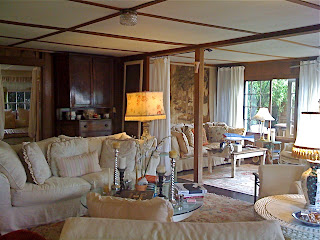PEOPLE STARTING TO INVEST IN REAL ESTATE AGAIN
Recently over dinner, a friend of mine startled me by saying he and his wife were looking to buy a lake cabin. I figured that in this time of economic uncertainty, people would still be stuffing their mattresses with hard, cold cash. But buying real estate? That seemed particularly surprising.
The more I've talked to people, though, the more I get a sense that things have started to change. While the economy remains in rough shape and the jobless rate continues to rise, the frantic desire to save and build cash reserves has ebbed. Those fortunate people who have weathered the storm are emerging from their fetal crouch and starting to think more about taking some investment risks.
What I find especially interesting is where most of my risk-taking friends are headed. It isn't the stock market; in fact, the only folks I know who have waded back into the stock market are the gunslinger types who never really left it.
Instead, they seem to be heading for real estate. At first I found this puzzling, given the brutal battering real estate has taken. But that's the point: An increasing number of my friends see this as the perfect opportunity to find something at a bargain-basement price.
And so, among my friends: A New York executive and his wife are looking for a summer place in New England; a small-business owner in Minnesota is thinking about acquiring some rental property; a New Jersey technology consultant is considering buying a small apartment in New York, perhaps with some other friends.
The Case for Real Estate
The people doing this are employed, feel confident that they're not going to lose their jobs, and believe that while housing prices may fall a bit more the bottom is not too far away. Moreover, financing remains relatively cheap and, according to one lawyer I know in house-hunting mode, banks aren't as tight with mortgage lending as headlines indicate.
As I wrote a couple of months ago, it's always dangerous to hypothesize a global trend based on the all-too-limited view from your own backyard. But it's also sometimes an insightful way to get a jump on what's coming. And for me, what's most intriguing is that, for now, most of this risk talk is prospective. There's no sense of rushing, no desire to "stretch" too far in making a purchase. It's like these people are permitting themselves to dream a little bit and get closer to pulling the trigger. But they want to be doubly sure before making a move.
What's more, all of these people have a similar, cautious, mind-set. They don't believe real estate will rebound or make a great investment. But they also don't think real estate will lose a lot of value. Instead, they are focused on real estate as something they can use: a solid place to live or play that should also be, at worst, an OK investment.
Not all investments are the same. You can't live in a stock certificate or gaze wistfully at a bond (at least most of us can't). In what is still a time of tumult, there's something deep inside us that finds the solidity of a home soothing. I think that explains why people moving out on the risk scale are focused more on real estate than on stocks or bonds.
The Personal Hunt
My wife and I recently considered buying some property, too. We don't own our home, and we've thought about one day returning to the Midwest. On a recent trip to Minnesota, we looked at several properties, including an old farmstead on the outskirts of St. Paul.
Examining the farmstead, it became clear why people who have ridden through this economic storm in decent shape are thinking more about real estate. It had been on the market more than a year, the price had fallen more than 60% and the seller would only take offers that didn't require the sale of another home before closing.
Ultimately, we decided not to purchase the house, but we continue to hunt because we believe bargains can be had. We also think those bargains aren't going away anytime soon, which is a thought shared by many and a big reason that real-estate sales remain sluggish.
Even as my friends, as well as my wife and I, consider making real-estate purchases, I am quickly reminded of how real-estate fixations got out of control earlier this decade.
An entrepreneur I barely know recently confessed how he owned seven homes, all of them rented, all of them underwater. He figures he'll do all he can to hang on until prices rebound. His credit cards are groaning and his business is struggling. He provides a stark reminder that investing in property can go off the rails as quickly as anything else.
That is probably why the current real-estate chatter I hear sounds very different from the speculative boom of the recent past. While buying a second home or even considering some rental property entails risk, I don't hear the kind of zero-down fervor familiar just a couple years ago. Instead, it's about buying something that you can touch, feel and see—and imagine holding onto for a long time.













































